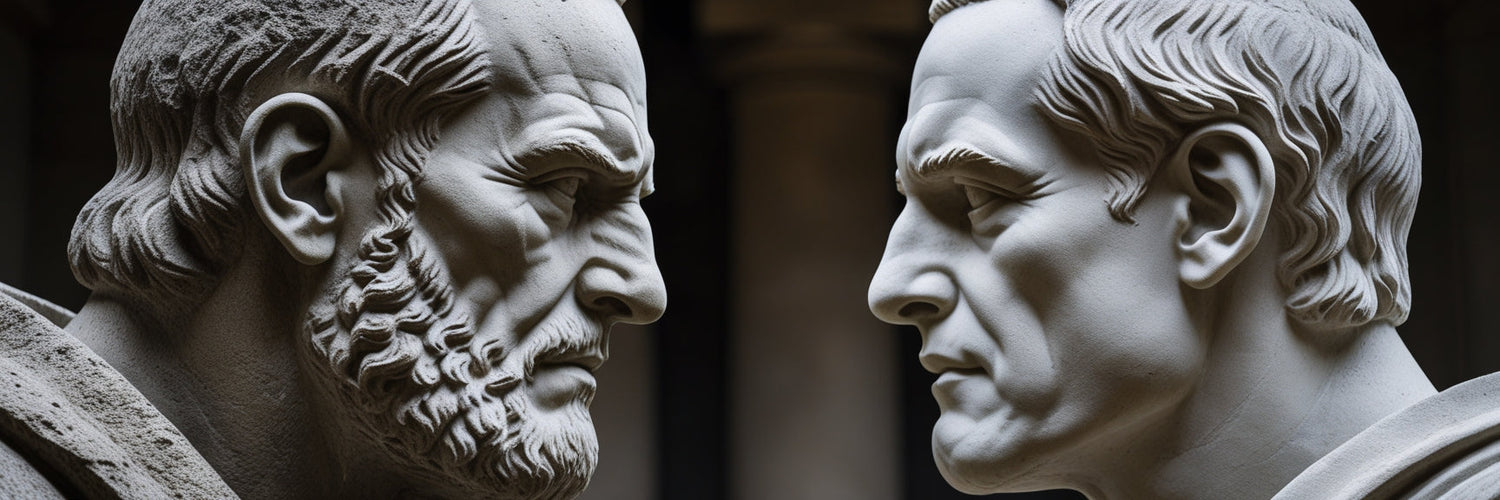Hobbes vs. Rousseau: Two Competing Views on Human Nature
The question of whether humanity is inherently good or bad has been a central debate in philosophy for centuries. Thomas Hobbes and Jean-Jacques Rousseau offered two of the most influential yet opposing perspectives on this issue. Hobbes argued that humans are naturally selfish and require strong governance to prevent chaos, while Rousseau believed that people are fundamentally good but are corrupted by society. Understanding their views sheds light on broader discussions about morality, governance, and the role of civilization.
Hobbes: Humanity as Selfish and Violent
In Leviathan, Thomas Hobbes painted a bleak picture of human nature. He described life in a state of nature as “solitary, poor, nasty, brutish, and short.” According to Hobbes, without laws or authority, people would act in their own self-interest, leading to competition, conflict, and violence. He saw self-preservation and fear of death as primary motivators of human behavior.
To avoid this state of perpetual conflict, Hobbes argued for a strong central authority, which he called the Leviathan. Only through strict governance and social contracts could humans be restrained from their destructive tendencies. His perspective influenced political philosophy, justifying authoritarian rule and the necessity of structured laws to maintain order.
Rousseau: Humanity as Good but Corrupted by Society
Jean-Jacques Rousseau offered a stark contrast to Hobbes. In The Social Contract and Discourse on Inequality, he argued that humans in their natural state are peaceful, cooperative, and virtuous. He believed that society, rather than nature, is responsible for human corruption. In his view, competition, inequality, and greed arise not from human nature itself but from the structures and expectations imposed by civilization.
For Rousseau, the solution was not strict authoritarianism but a social contract based on collective will—one where governance serves the people rather than controls them. He believed in individual freedom and communal responsibility, suggesting that humans could live harmoniously under the right societal conditions.
Who Was Right?
The debate between Hobbes and Rousseau continues to shape modern discussions about governance, criminal justice, and ethics. If human nature is selfish and aggressive, as Hobbes suggested, then strong laws and enforcement mechanisms are necessary to maintain order. If people are naturally good but corrupted by external forces, as Rousseau claimed, then reforms that address inequality and systemic injustices may be the best way to create a better society.
Modern psychology and sociology suggest that both perspectives contain elements of truth. Humans have selfish instincts, particularly under stress or scarcity, but they are also capable of cooperation, empathy, and altruism. The way societies are structured often determines which tendencies are reinforced.
The Role of Society in Shaping Morality
Rather than assuming humanity is wholly good or evil, a more nuanced approach considers the conditions under which people act morally or immorally. Institutions, cultural values, and economic systems play a crucial role in shaping behavior. When systems promote trust and fairness, people tend to act more altruistically. When inequality and competition dominate, selfishness and exploitation become more pronounced.
Understanding Hobbes and Rousseau’s arguments helps us navigate modern debates on governance, justice, and ethics. Whether shaping laws, policies, or educational systems, the question of human nature remains foundational in designing a just and functional society.
























































